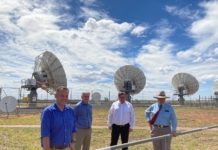New Zealand’s Ministry of Business, Innovation & Employment (MBIE) has set up a Str Catalyst: Strategic Space Fund, which has recently invested NZ$500,000 (approximately US$300,000) into each of six space research projects. This totals NZ$3m (app US$1.9m), which will be delivered across 3 years.
The funding will support these recipients in developing space technologies through international partnerships with organisations such as LeoLabs, the University of New South Wales Canberra, the German Aerospace Centre (DLR), and the Japanese Aerospace Exploration Agency (JAXA).
The 6 recipients, out of a total 29 proposals, are:
- Dawn Aerospace: Development of environmentally friendly, high performance satellite propulsion systems for replacement of toxic hydrazine
- Swarm NZ Limited: Advanced small satellite control systems for collision avoidance and orbital debris mitigation
- The University of Auckland: Small-satellite radar to monitor NZ’s oceans and coasts
- The University of Auckland: Space satellite mission design and control
- The University of Canterbury: Developing nanosatellites for protein crystallisation
- Victoria University of Wellington: Thermal management of cryogenic superconducting magnets in small satellites
MethaneSAT
This announcement comes shortly after the New Zealand government announced it would contribute $26 million towards MethaneSAT, an United States-based NGO Environmental Defense Fund (EDF) and its subsidiary MethaneSAT LLC. The satellite aims to detect global methane emissions with unprecedented accuracy, and is scheduled to launch in 2022. New Zealand will provide a mission control centre for the satellite, at a location to be confirmed at a later date – this is the government’s first official space mission as a country, which has had a space agency since 2016.
Dr Peter Crabtree, GM of Science, Innovation and International at MBIE and head of the New Zealand Space Agency, said “This investment has three key benefits for New Zealand – we are showing global leadership by investing in a science mission that will directly help to fight climate change, we are giving Kiwi researchers the opportunity to join a cutting-edge climate science mission that will see them working alongside the world’s best climate scientists and aerospace experts, and we are building important capability in our rapidly growing space sector.”
“New Zealand already makes significant investments in climate science and in research to reduce domestic greenhouse gas emissions. We will be building on these efforts by working with EDF, which has a proven track record in conducting excellent science to inform decision making.”







